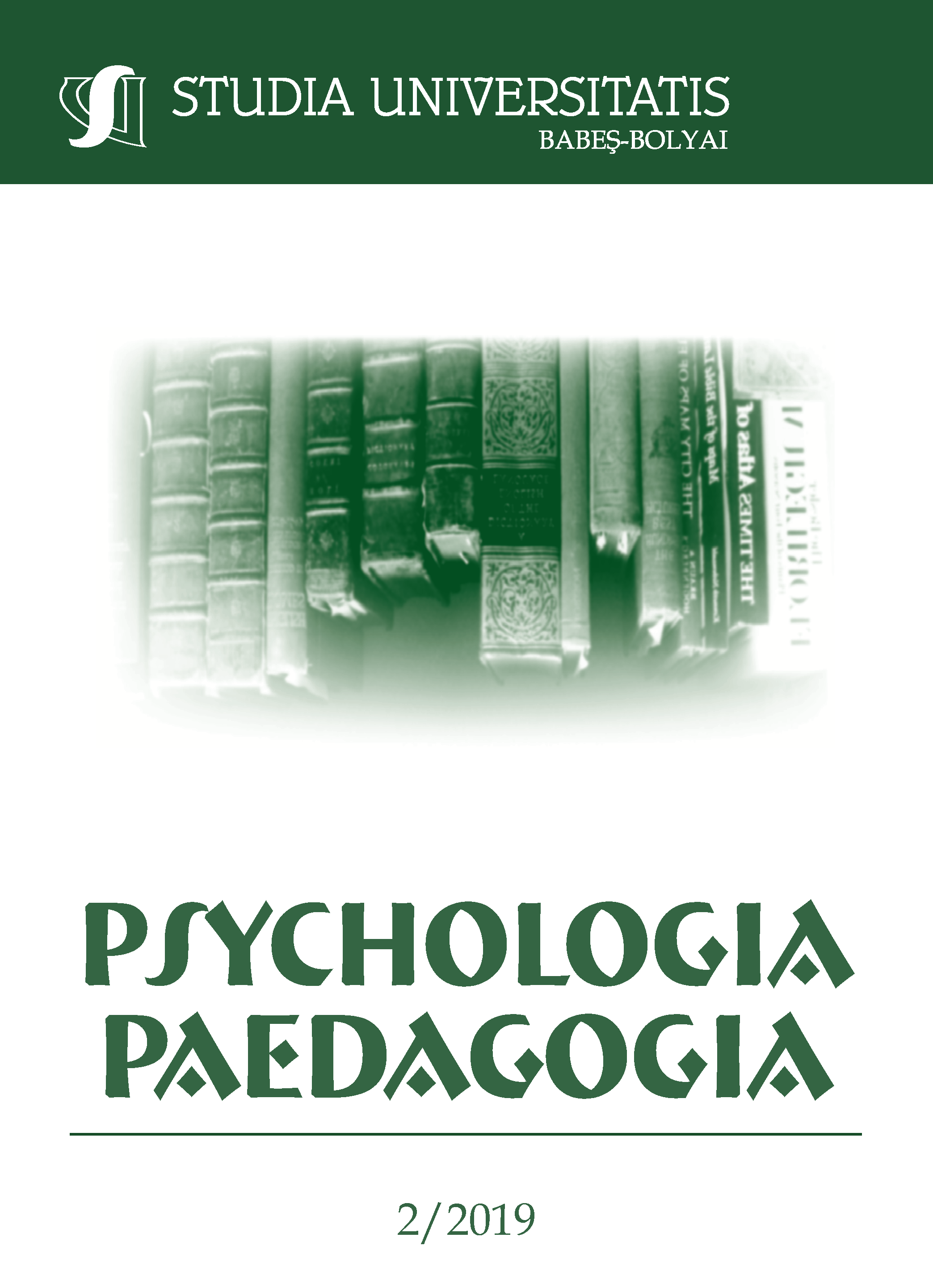USERS’ SATISFACTION WITH REGARD TO TA’ASIYEDA INTERVENTION PROGRAM FOR PROMOTING TECHNOLOGICAL EDUCATION THROUGH COLLABORATION WITH THE INDUSTRY
DOI:
https://doi.org/10.24193/subbpsyped.2019.2.01Keywords:
Technological Education, Ta’asiyeda Educational intervention programs, increasing students’ motivation, required skillsAbstract
Israel, like many other countries worldwide, suffers from a lack of skilled human resources with technological qualifications. Ta’asiyeda, an association established by the Manufacturers’ Association, has operated for the past 27 years an educational intervention program to promote students to technological routes and prepare them for the labor market by creating cooperation between the education sector, industry and employers. A formative evaluation research was conducted using quantitative methods to identify the level of satisfaction with the intervention program expressed by principals, teachers and industry staff. For this research, a new questionnaire was developed and validated and quantitative statistical data was collected from 222 participants (principals, teachers and industrialists) that participated in the Ta’asiyeda program. The research results show that all program participants were equally satisfied with Ta’asiyeda’s contribution with regard to the five aspects examined in the research: The collaboration between the industry and schools; Pedagogic components of the intervention program (knowledge, values and skills); The implementation process of this educational model in Israel; Students’ motivation for technological education; Contribution to participants (from the education system and the industrial system). In comparisons conducted between the research populations, it was found that in the cases of significant differences, industrialists were more critical and less satisfied. With some aspects, respondents from high schools were less satisfied than respondents from junior high schools. And industrialists from the high-tech industry and from the low-tech industry ranked their satisfaction similarly and relatively high. The research conducted proposes an effective optimal feasible model to help the organization make decisions leading to program improvement. The research conclusions can be adapted to other countries that cope with this issue of connecting education and industry for promoting and encouraging technological education in schools.References
Adler, H. (2008). Perception of a Manager’s Role in the State of Israel. Report of the Professional Committee for Formulating Recommendations Regarding the Ministry of Education Policy. Jerusalem: Avney Rosha Institute (In Hebrew).
Barak, M. (2014). Training or education. Educational Echo, 86(3) [In Hebrew].
Beyth-Marom, R., Gordoni, G., Tzemach, M. (2009). Research Methods in the Social Sciences, Guiding Principles and Research Styles, Survey. Unit 5, Ra’anana: Open University.
Brender, A. (2017). The labor market in Israel: Demand, wages and skills. Research division, Bank of Israel.
Deci, E.L. & Ryan, M. (2000). The what and why of goal pursuits: Human needs and self-determination of behavior. Psychological Inquiry, 11, pp. 227-268.
DEVCO. (2017(. Reference Document 24 - Vocational education and training for inclusive growth in development cooperation: Tools and methods series. Reference Document 24, European Commission, Brussels.
Dobbs, R., Madgavkar, A., Barton, D., Labaye, E., Manyika, J., Roxburgh, C., Lund, S. & Madhav, S. (2012). The world at work: Jobs, pay, and skills for 3.5 billion people. McKinsey Global Institute.
Dressler, M., Sela, L., & Mazor, S. (2014). Experiential learning – supporting theories. Eureka, 37, 1-7 [in Hebrew].
Flum, H. & Kaplan, A. (2006). Exploratory Orientation as an Educational Goal. Department of Education Ben-Gurion University of the Negev, Beer Sheva, Israel.
Hanushek, E.A. & Woessman, L. (2017, June 28). Apprenticeship programs in a changing economic world. Retrieved from URL: https://www.brookings.edu/blog/brown-center-chalkboard/2017/06/28/apprenticeship-programs-in-a-changing-economic-world
Kolb, D.A. (1983). Experiential learning: Experience as the source of learning and development. Prentice-Hall, Englewood cliffs, New-Jersey.
Kromholtz, N. (2013). Constructivism – learning theories and educational philosophy and its implementation in Media+ surroundings. In Idea Center, Tel-Aviv University [in Hebrew]. Retrieved from: http://web.macam.ac.il/~tamil/hadracha/construkt.htm
Kuczera, M., T. Bastianić and S. Field (2018). Apprenticeship and Vocational Education and Training in Israel, OECD Reviews of Vocational Education and Training.
Likert, R. (1932). A technique for the measurement of attitudes. Archives of psychology.
McKinsey Center for Government (2014). Education to employment: Getting Europe’s youth into work. McKinsey Center Publications. Retrieved on Nov. 1st, 2017 from: https://www.mckinsey.com/industries/social-sector/our-insights/converting-education-to-employment-in-europe
Melamed, U. (2010). Communication technology worldwide, Information paper, April 2010. Tel Aviv, Mofet Institute [in Hebrew].
Ministry of Education (2000). Director General Circular 61/2(a). http://cms.education.gov.il/educationcms/applications/mankal/arc/sa2ak3_4_4.htm [in Hebrew].
Ministry of Education (2010). Director General Circular 21a (22-1.2): Procedure for Approving External Programs – Third sector bodies and business community. http://www.sheatufim.org.il/multimedia/upl_doc/doc_130514_103213.pdf [in Hebrew].
Mioduser, D., & Santa Maria M. (1995). Students’ development of structured knowledge representations. Journal of Research on Computers in Education.
Moshe, N. (2016). Planning manpower for the future labor market. Jerusalem, The Knesset Research and Information Center [in Hebrew].
Mourshed, M., Farrell, D., & Barton D. (2012). Education to employment: Designing a sector that works. In McKinsey & Company. Retrieved from: https://mckinseyonsociety.com/downloads/reports/Education/Education-to-Employment_FINAL.pdf
Mühlemann, S. (2016). “The Cost and Benefits of Work-based Learning”, OECD Education Working Papers, No. 143, OECD Publishing, Paris. http://dx.doi.org/10.1787/5jlpl4s6g0zv-en
Musset, P., M. Kuczera and S. Field (2014). A Skills beyond School Review of Israel, OECD Reviews of Vocational Education and Training, OECD Publishing. http://dx.doi.org/10.1787/9789264210769-en
OECD. (2010). Learning for Jobs, Synthesis Report of the OECD Reviews of Vocational Education and Training. OECD Publications.
OECD (2014). Skills Beyond School: Synthesis Report, OECD Reviews of Vocational Education and Training, OECD Publishing.
Quintero, D. (2016, July 27). Innovations in workforce development: partnering schools with industries. Retrieved from URL: https://www.brookings.edu/blog/brown-center-chalkboard/2016/07/27/innovations-in-workforce-development-partnering-schools-with-industries
RAMA – National Authority for Measurement and Evaluation in Education (2019). Measurement at the Service of Learning. http://cms.education.gov.il/EducationCMS/Units/Rama/HaarachatProjectim/
Remillard, J.T. (2016). How to partner with your curriculum. Educational Leadership. Oct2016, Vol. 74 Issue 2, pp. 34-38.
Schleicher, A. (2017). What does PIAAC say about skills and digitalization? Presentation presented at PIAAC Research Conference. OECD Publications.
Smits, W. (2006). “The Quality of Apprenticeship Training”. Education economics, 14(3), 329-344.
Szold, H. Institute (2019). The national Institute for Research in the Behavioral Sciences – Activity, Research and Evaluation.
Ta’asiyeda (2018). Documents and reports. In GuideStar website. Retrieved from: http://www.guidestar.org.il/he/organization/580210094
World Economic Forum (2016). The Future of Jobs Employment, Skills and Workforce. Strategy for the Fourth Industrial Revolution, Global Challenge Insight Report.
Downloads
Published
How to Cite
Issue
Section
License
Copyright (c) 2019 Studia Universitatis Babeș-Bolyai Psychologia-Paedagogia

This work is licensed under a Creative Commons Attribution-NonCommercial-NoDerivatives 4.0 International License.





